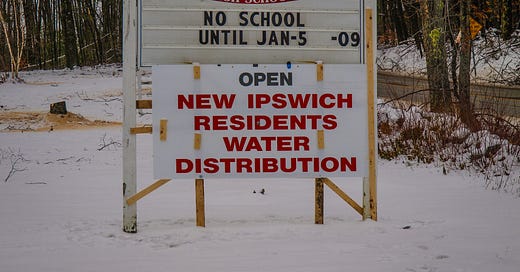FINNS: An Oral History of Finnish-Americans in New Hampshire’s Monadnock Region
Excerpted from FINNS: An Oral History... by Patricia Kangas Ktistes, 1997, all rights reserved.
Linda (Dicker) Montague
In the morning, by the time the school bus got beyond Smithville, probably 90 percent of the kids on it were Finnish. They didn’t call off grade school very much. And when it was a bad day in winter coming home, you had to come up that long hill by Kusti Luhtala’s farm, which was very, very steep. When you got to the top, you had to make a 45-degree, left-hand turn. If you could have just kept going straight up the hill that would have be one matter. But you had to slow down to make the turn, so you’d lose momentum.
Martin Somero, the bus driver, would have us move to the back of the bus. He’d try that first. Put some extra weight back there. If that didn’t work, he’d back all the way down the hill, then put on the chains. He was so patient. He really was a good driver because he was just so calm and cool. And if that failed, just to kind of give that extra boost to get going initially, he had a few of the big Finn boys go out and they’d help with the chains and even pushed a little bit. They wouldn’t do that these days! The school board would be all afraid of lawsuits. These days if they had such stormy weather they’d call school off.
The new Mascenic Regional Junior-Senior High School was very wild. The first year they had not quite completed the building on schedule and we went to school a month late. I liked that because I could enjoy the outdoors during the month of September while not in school. And then what I found was that the new school didn’t have walls when classes began in October 1968.
The office complex was in the central portion of the new regional school, with classrooms and moveable dividers around the edges, which allowed for more noise to interrupt the classes. And it was more distracting, too, because instead of grades seven through 12, which we previously had at Appleton Academy, now we had as well, grades five and six, with numerous lively little kids. Another change from Appleton Academy was that Mascenic’s faculty comprised mostly young newly minted teachers, and some of them were good.
I must say that as a student, you had to really concentrate to get the assignments completed and make something out of it in that distracting environment. Then, of course, it was the late 1960s and the whole world was changing. The public-education system was beginning to be influenced by the liberal establishment and what I would call the radical left-wing element. There was a backlash in the community because there were certain books featured in the library, the curriculum, and lack of student discipline. A concerned citizens’ group was formed, which was influenced to a great extent by the Apostolic Lutheran Finns, and it was called TIME, which stood for “To Improve Mascenic Education.”
These religiously conservative Finns did not approve of some practices at the new avant-garde school, which they felt flew in the face of their religious beliefs, so I think the school administration gradually did tighten down a bit, with changed some policies and whatever at the school, to placate the TIME committee. There was a dress code at Mascenic when I attended, but the next year, at graduation 1971, there were a number of boys in the graduating class who had long hair, beards, and mustaches, which would never have been allowed the year before.
I really think that a lot of the religiously conservative Finns were turned off by the initial liberal intonations and policies at Mascenic, and justly so, because their tax dollars were going to support the school. It was a shock for them, as it was for members of the general community. They had impact through the TIME committee on school policies, and I think that they managed even to replace a few school board members. Daily life at Mascenic sometimes was out of control, but always fun. I really enjoyed the experience, and I did very well in school.




The answer is yes. Since I was so much older than my 2 brothers I was more like an 'uncle'. I went to Northeastern U which was year round due to the co-op plan, so I didn't spend much time with my brothers. In addition I had a weekend job as an emergency lab tech.
I became a resident of Burlington, Vt in 1967 and missed the closing of Appleton and the opening of Mascenic. My 3 sisters went to Appleton and had no complaints and became productive adults. The youngest sibling at the time in the family went to Mascenic. He was a smart kid but got into the wrong crowd and was into marijuana and coke. He had trouble holding jobs and on occasion I loaned him money never expecting to get repaid. He moved to Florida and worked at various non-skill jobs. My father was retired there and my brother lived briefly with him until my father asked him to leave due to his addictions. Many years after my father died (which was 1993) our county sheriff came to our house to tell us my brother had committed suicide. It may not have been Mascenic's fault, but the atmosphere in a larger public school environment and the greater availability of drugs in more recent times was most likely a significant contributing factor. I think the TIME group that Linda mentioned was probably on the right track with their concerns.